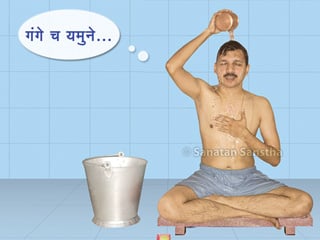Brahmamuhurt is a 1.45-hour period in the early morning that commences at 3.45 a.m. and ends at 5.30 a.m.. This is called the 4th prahar of the night or uttarratra. It is during this period that several events occur providing us the required energy for all our daily activities. Waking up in this time endows nine simultaneous benefits.

1. Receiving oxygen in large quantities
During this period, ozone gas concentrates in large quantity in the lowermost layer of the atmosphere of the earth. Ozone contains high quantities of oxygen which is required for respiration by humans. That is why if one wakes up at this hour and takes a deep breath through the right nostril it results in purification of his blood. Higher oxygen content in the blood results in an increase in hemoglobin thus providing us reprieve from 90% of the diseases.
2. Wake up till the sky is still lit with stars
During this period the sky is dimly lit. If you open your eyes in a bright light, you feel blinded for a moment. If this occurs repeatedly then the eye disorders may set in causing the eyesight to weaken. To prevent this, one should wake up when the sky is still lit dimly with stars.
3. Smooth functioning of Apan vayu
During this period, out of the five Cosmic Principles, Vayutattva (Absolute Air Principle) is most active and in the human body the Apan vayu is active. Apan vayu performs the task of excretion of faeces and cleansing of the physical body. Therefore, when this vayu is active the expulsion of faeces occurs smoothly. Straining while passing stool may lead to piles with the passage of time. To prevent occurrence of piles, and for excellent cleansing of the bowels one should pass stools during Brahmamuhurt. Also as per the organic clock, energy is active in the large intestines of our body during this period.
4. Significance of expulsion of waste
through the nine openings in the body during Brāhmamuhūrt
Waste accumulated in our body throughout the day is expelled from the nine openings of the body viz. two eyes, two nostrils, two ears, mouth, urinary and anal openings. The waste gets accumulated at these 9 openings at the night. This waste contains several diseases causing bacteria and viruses. They may multiply rapidly in the presence of sunlight and may cause diseases. To prevent this, one should wake up at the Brahmamuhurt to expel this waste out of the body.
5. Significance of bathing at the Brahmamuhurt
If one bathes at the Brahmamuhurt, before the sunrise, then the skin pores open allowing absorption of pure air present during this period. This pure air provides pure oxygen to all organs charging the entire body for daily chores. Thereafter, despite performing activities throughout the day the body remains enthusiastic.
6. Awakening of memory and other energy centres in the brain
Chanting ‘Om’ during this period helps activating memory and other energy centres in the brain. If one performs study during this time, one will remember for a longer time as compared to other times.
7. Importance of purification of the physical body at the Brahmamuhurt
At sunrise various health endowing frequencies enter the atmosphere along with the sunrays. If our skin pores are open, then these can get absorbed. Therefore, one should wake up at the Brahmamuhurt to cleanse the physical body.
8. Activation of the seven chakras by performing spiritual practice
The seven chakras get activated if one performs spiritual practice of chanting Om during this period. Purity of the atmosphere during Brahmamuhurt enables generation of more vibrations which in turn activates the kundalini (Spiritual energy system).
9. Availing guidance from meritorious and Saintly souls
During Brahmamuhurt, several meritorious and Saintly souls descend onto the earth from other regions. By performing spiritual practice, one can meet them and avail excellent guidance from them.
One can receive all these nine benefits by waking up at the Brahmamuhurt.

 How to plan your day effectively?
How to plan your day effectively? Astrological viewpoint : On which days should nails be cut?
Astrological viewpoint : On which days should nails be cut? Varsha Rutucharya – a key to remaining healthy during the rainy season
Varsha Rutucharya – a key to remaining healthy during the rainy season Actions required to be performed after cleansing the teeth
Actions required to be performed after cleansing the teeth Cleansing the teeth
Cleansing the teeth Prayer to be recited before a bathand shlokas to be recited while bathing
Prayer to be recited before a bathand shlokas to be recited while bathing